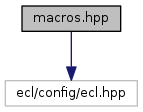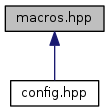#include <ecl/config/ecl.hpp>

Go to the source code of this file.
Macros | |
| #define | ECL_CXX11_NOT_FOUND |
| C++11 support is available. More... | |
| #define | ECL_DEPRECATED |
| Deprecated compiler warnings. More... | |
| #define | ECL_DONT_INLINE |
| Prevents a function from being inlined. More... | |
| #define | ECL_HELPER_EXPORT |
| Declare public visibility for libraries. More... | |
| #define | ECL_HELPER_IMPORT |
| #define | ECL_HELPER_LOCAL |
| #define | ECL_LOCAL |
| #define | ECL_PUBLIC |
Macro Definition Documentation
| #define ECL_HELPER_EXPORT |
Declare public visibility for libraries.
This emits (in a cross platform way) the required symbols for setting whether a function/class should be visible or hidden. Note only does this protect the private parts of your library, but it can also greatly speed up the linking process.
To check what symbols are being exported for a gnu library,
Usage:
Each package needs to create it's own macro to make use of the macro that cmake defines for library targets:
And use it alongside class or function definitions:
- See also
- ECL_HELPER_IMPORT, ECL_HELPER_LOCAL
Definition at line 163 of file config/macros.hpp.
| #define ECL_HELPER_IMPORT |
- See also
- ECL_HELPER_EXPORT, ECL_HELPER_LOCAL
Definition at line 162 of file config/macros.hpp.
| #define ECL_HELPER_LOCAL |
- See also
- ECL_HELPER_EXPORT, ECL_HELPER_IMPORT
Definition at line 164 of file config/macros.hpp.
| #define ECL_LOCAL |
Definition at line 170 of file config/macros.hpp.
| #define ECL_PUBLIC |
Definition at line 169 of file config/macros.hpp.